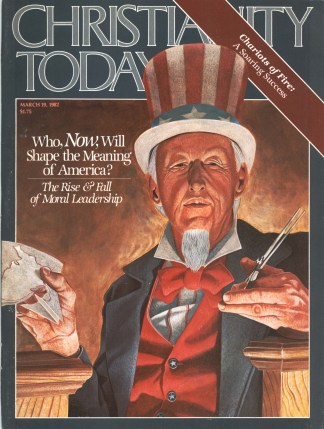To the common newspaper reader, the comics are the bright spots in a pile of oppressive reading. After murders, complex international events, and omens of an economy squeezing even tighter, the funnies are a refuge.
But to the men and women who write and draw them, the funnies are serious business. Tim Downs knows, because he is the author of the nationally syndicated “Downstown.” He is also a traveling lecturer for Campus Crusade for Christ.
The inevitable question, of course, is: Does Downs’s faith have any relevance to what shows up on the funny page? He has no doubt. “I write a Christian comic strip because I am a Christian.… My basic philosophy is a biblical philosophy of life,” he says.
Still, Downs wants to be subtle. Blatant Bible pounding would alienate readers, and broad-brush nuances from his art. One of Downs’s most clever and profound series occurred last Christmas, when he depicted children asking hard questions about Santa Claus. One boy wrote earnestly to the North Pole: “They say you know if we’ve been sleeping; you know if we’re awake. Doesn’t this demand omnipresence? You know if we’ve been bad or good. This implies your authority to assign moral absolutes. Are you aware of the staggering theological implications of these claims?”
Downs’s favorite series was inspired by evangelical philosopher Francis Schaeffer. Agreeing with Schaeffer’s theme that modern man has turned from absolute truths and is lost in amaze of relativities, Downs invented a superhero called “Captain Relative.” The captain, appropriately dressed in gray (“for all the gray areas of life,” explains Downs), goes about doing good deeds—relatively good deeds. He rescues a girl’s cat from a tree, but, when she has no money to reward him, throws it back into the branches. He is told he is fat, but counters, “From whose point of view?” The not-so-super hero is finally convinced of his error when he lectures a woman whose purse was snatched. She should remember the pernicious influence of the snatcher’s upbringing, he tells the woman. Then the captain discovers his own wallet is gone, and he immediately wants the thief caught.
Most readers cannot know Downs seeks to “honor God with my comic strip,” nor would they realize that one of the factors going into the strips production is prayer. “I know that would sound haughty to the non-Christian, like I think my comics are God-inspired. That’s not what I mean,” says Downs. No one really knows where an idea comes from, he adds. “I’m just in the habit of thanking God whenever an idea pops into my head.”
“Downstown” appears in 25 daily newspapers, the largest being the Los Angeles Times. At one time it ran in 50 papers, and Downs admits he is struggling to attract a wide following. Still, the funny page is the most read page in the newspaper. “If you want to be a communicator, you’ve got to speak where people are listening,” Downs argues. “Surely, with my handful of papers, I’ve got 5 million readers. That’s a tremendous platform.”
On his speaking tours for Campus Crusade, Downs crisscrosses the country to speak to college students on Christian apologetics and relationships. He travels with his wife, Joy. To the audiences Downs often addresses, BYOB means Bring Your Own Booze—not Bring Your Own Bible. Yet he exhibits an obvious enthusiasm for the lectures. Most students, he finds, will hear out anyone who is sensitive and sincere.
Downs’s work is not done after a day of discussions with students. Every six weeks he must submit 36 comic strips to his syndicate, Universal Press. The larger Sunday strips are submitted each week With his drawing equipment stashed in half a suitcase, Downs frequently does cartoons while traveling. He wishes he were “disciplined enough” to sit down every day and devote a few moments to conceiving and executing comics, “but I’m not.” Instead, Downs usually works two or three 14-hour days to catch up.
That doesn’t mean he does sloppy work. A graduate in graphic arts from Indiana University, Downs is more concerned about the technical quality of his cartoons than many other artists. There are two parts to doing the comic strips: writing and drawing. Some comic strip authors are artists who learn how to write. Most today are writers who learn how to draw, says Downs.
He writes gags first, mailing a packet of 15 to 20 “scripts” to syndicate editors, who then tell him which jokes meet approval. The drawing comes later, and it takes Downs from two to two-and-one-half hours to execute a single strip. “It’s frustrating that people read it in a few seconds. You can go through a year’s work in an hour,” Downs admits.
A central cast of five characters populates “Downstown.” They began as college students because the comic originally appeared in college newspapers. When Universal picked it up two years ago, the syndicate believed the college setting too limiting. So Downs’s characters are now “postcollege, pre-career, searching out the path.”
The most popular is probably Chuck Laylo, an arrogant but harmless former collegian who still lives in his fraternity house. Laylo, says Downs, “is a conglomerate of all the male masks. He is one giant phony, and he’s the only one who doesn’t know it.”
Other citizens of “Downstown” are young adults constantly experimenting with the latest fashions in thought and commerce. They are the first on their block to buy the microwave’s successor, the nuclear oven. In consecutive strips, the characters worry about changing the oven’s contaminated rods, wonder if they should eat a salad that glows, and ponder what will happen if the oven has meltdown. “For one thing,” John determines, “you can forget the spinach almondine.”
Downs can not explicitly preach the gospel in his unusual forum, but he aims to “get people thinking.” Indeed, the unsuspecting reader of “Downstown,” looking only for an easy laugh, may end up thinking about something infinitely more urgent than the fate of the prime rate.
Who Will Represent Latin America’S Protestants? Two Organizations Try
In the name of “unity,” two organizations are recruiting members in an effort to represent Latin American Protestantism. Next month the Latin American Evangelical Confederation (CONELA) will be organized, and in November the more ecumenical Latin American Council of Churches (CLAI).
Latin American Protestantism has been, until relatively recently, a homogeneous movement, sharing a traditionally evangelical theology, evangelistic fervor, and informal worship styles. Periodic conferences have provided some framework of unity to the Protestant scene. These events have drawn representatives of both denominational and interdenominational traditions, although the more recent gatherings have tended to reflect support by the historic denominations for the Latin American Evangelical Pro-Unity Movement (UNELAM). (In Latin America, “evangelical” is a substitute word for “Protestant,” a word with negative connotations on an overwhelmingly Roman Catholic continent.) UNELAM tried to organize mainly on the basis of nationwide councils or federations of church bodies.
But such nationwide organizations have had limited success in Latin America. Where they have prospered, as in Costa Rica or Colombia, they have refused to align with any international structure, avoiding the division at the local level that could result from joining either the ecumenical camp or some other international movement.
UNELAM was dissolved to clear the way for the Assembly of Christian Churches of Latin America in 1978 in Oaxtepec, Mexico, which resulted in a decision to form CLAI. This time, however, the structure was not tied to nationwide councils, but rather to denominations and interdenominational parachurch organizations. Since 1978 CLAI has been “in formation,” and its organizers have been working hard to enlist church bodies for its constituent assembly in November. The ad hoc president is Methodist Bishop Federico Pagura of Argentina, and the executive secretary, Gerson Meyer of Brazil.
CLAI’S objectives reveal a broad social and cultural concern, as well as its aim to “encourage churches to fulfill their evangelistic task ‘so that the world may believe.’ ” Reflecting the Roman Catholic church’s stated commitment to the poor, CLAI’S objectives also include a concern for the poor.
CONELA may be identified more closely with newer denominations, products of the “faith” missions. It was at the 1980 consultation on evangelism in Pattaya, Thailand, that a number of Latin American delegates decided CONELA should be formed.
The president of CONELA’S ad hoc committee is Asdrúbal Ríos, a Venezuelan, and the executive secretary is Marcelino Ortiz of Mexico. Invitations to attend the April meeting in Panama have been extended not only to church bodies but also to local congregations.
CONELA’S objectives emphasize evangelization, theological reflection, and holistic church growth. Its social concern is expressed in its objective to “publish criteria regarding the church’s social responsibility.”
In comparing other objectives of the two organizations, CLAI anticipates visible forms of unity in worship, study, and witness, while CONELA hopes to develop “a sense of spiritual unity,” assuming that spiritual unity already exists among like-believing Christians. The slogans of each assembly also reveal differences, CLAI’S theme emphasizes commitment to the kingdom, while CONELA’S theme revolves around the advance of the church.
CLAI’S publications emphasize such problems of the region as human rights, violence, and women’s rights. One publication states that unjust structures are “in the final analysis the cause of the problems we have in Latin America.” The emphasis on evangelism in CONELA’S publications implies that man’s heart should be the focus of the church’s attention. CONELA’S claim that it represents the majority of Latin America’s Protestants is probably true. Ríos and Ortiz, on a CONELA promotional trip in February, found that churches wanted to send more representatives than could be accommodated in Panama City’s La Siesta Hotel. Most congregations are either unaware of liberation theology or not so political as to accept it. But neither can they easily overlook the poverty and inequalities that surround them.
The strong idealism of Protestants in Latin America has led to a “Bolivarian dream” of continental unity; that idealism resists the creation of rival centers of allegiance as found in North America. The Association of Costa Rican Bible Churches, for instance, voted in its January convention to abstain from joining either movement, rather than contribute to polarization.
But several conservative groups that have made overtures to the CLAI leadership report that liberal control of its administrative staff is such that they have been unable to win a hearing for their concerns. They have therefore concluded that CONELA is a practical necessity.
HARRY GENET with PAUL E. PRETIZ










